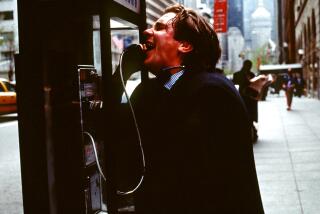The Big Picture: Wanted: a few good mavericks
When I began writing this column in 2000, I was wringing my hands about what looked like a new low in the movie business. Sony Pictures was about to release “Charlie’s Angels,” a less-than-stellar remake of a less-than-venerable TV show. It sounded like a terrible idea, especially when I discovered that the studio had paid a whopping 17 writers to work on the film — including A-listers such as Akiva Goldsman and Susannah Grant, and a batch of”Seinfeld” vets who did a round-table joke writing session right before production started.
The whole concept — using a squadron of writers to turn a flyweight sitcom into a splashy action film — felt so, well, lame that I boasted in the column about betting a Sony executive that the movie wouldn’t make $30 million its opening weekend.
Needless to say, I lost: The movie opened to $40 million and went on to make $260 million around the globe. So what did I learn? In the world of studio films, just when you think you’ve reached a new low, look again. Hollywood is a business where, when it comes to the lack of originality, it’s impossible to say you’ve hit bottom because the floor just keeps dropping.
PHOTOS: The billion-dollar box-office club
The entire business model for today’s movie business is rooted in an aversion to originality. When it comes to marketing an expensive movie, brand familiarity is the name of the game. The majority of this year’s top 25 grossing films are sequels, remakes, reboots or rereleases, and films based on familiar characters from books and comics.
There are some exceptions — Pixar built its brand on new ideas, and we just had a blast of irreverent comic fresh air from Seth MacFarlane’s”Ted.” And soon it will be Oscar season, when audiences will hopefully have a fair number of distinctive new films to choose from.
But many of today’s most gifted filmmakers — notably Sam Raimi, J.J. Abrams and Joss Whedon — have spent too much time working on studio plantations, putting their talents to use on sequels and reboots of familiar material. The opportunities to break new ground are few and far between.
Spike Lee was asked recently if he could get “Malcolm X”— which Warner Bros.released in 1992 — made today, and he replied: “I don’t think Oliver Stone gets ‘JFK’ made today. Unless they can make JFK fly. If they can’t make Malcolm X fly, with tights and a cape, it’s not happening.”
Lee was on my mind, having just seen his new film, “Red Hook Summer.”Though it’s hardly his best movie, it features a wonderful acting turn by Clarke Peters as a storefront preacher and offers a compelling portrait of a place — Lee’s adopted borough of Brooklyn — in transition. Coming at the end of a cinematic summer full of lumbering, hot-air extravaganzas, “Red Hook” felt like a cool breeze, perhaps because such a personal film is rarely seen today. So personal, in fact, that Lee made it with his own money and there was precious little interest from any major studios for its distribution.
When I first started writing about film in the mid-1980s, Lee was making a big splash with his debut, “She’s Gotta Have It,” which like his new movie, was shot in Brooklyn on a shoestring budget with no-name actors and a crew largely recruited from NYU, where Lee went to film school and now teaches. Lee wasn’t alone: At that time, the industry saw a dramatic flowering of indie directors, including Jim Jarmusch, David Lynch, Wim Wenders, Jonathan Demme, John Sayles, Susan Seidelman and the Coen brothers.
PHOTOS: NC-17 films -- Why they got the rating
Sadly, with the exception of Lee and the Coens, the other filmmakers have largely lost their mojo or been marginalized, unable to secure a niche in a business geared more toward safe commercial bets than risky propositions. Lee has survived on his own terms, maintaining his distinctive voice while working not only in film but also TV, Broadway and beyond.
In 1988, not long after his first success, I heard Lee give a speech to a group of black college students in which he preached the value of capitalism. If you didn’t own your own business or brand, he said, you’d always be working for the man. As a filmmaker, Lee has practiced what he preached. He runs a Brooklyn-based production company that has made enough money, largely through Lee-directed ads, to allow him to fund internships and college prep programs as well as make such message-oriented documentaries as “When the Levees Broke,” the Emmy Award-winning TV miniseries about the devastating impact of Hurricane Katrina on New Orleans.
It’s what makes Lee different from indie peers Paul Thomas Anderson or Wes Anderson. They are gifted filmmakers, but they seem to disappear down a rabbit hole between films, while Lee is always on call, weighing in on issues that matter.
I’ve tried to do the same thing as a columnist, which is perhaps why I’ve always had a soft spot for Lee, even when his harsh rhetoric has gotten him in trouble. I see my job as connecting the dots, digging past the superficial headlines of the day to get at deeper issues. It’s easy, for example, to slam the academy for having zero people of color up for any of the major Oscars, as happened in 2011, but the real problem is that Hollywood is one of the most minority-free industries in America.
If you’ve read me, you know I admire outsiders, not just because they’re great copy, but because mavericks — be it Lee, Mark Cuban or Billy Beane of”Moneyball” fame — inspire innovation. They take more risks than any corporate behemoth, which is why New Line (before it merged withWarner Bros.) ended up with the “Lord of the Rings” trilogy, and Lionsgate hit the jackpot with”The Hunger Games.”
Since that first “Charlie’s Angels” column, I’ve written hundreds of columns. This is my last. I’ve blown plenty of calls. I’ve gotten too caught up in the emotion or hurly-burly of the moment, like when I wrote after9/11that Hollywood would forever embrace a new seriousness of purpose. (Hah!) But I hope I’ve gotten a few things right and even occasionally made a difference.
Years ago, I wrote a column that inspired a flood of hostile letters. One day my phone rang: It was Larry Gelbart, the great playwright and screenwriter of “Tootsie,” “Oh, God” and other movies. He offered encouragement, saying I shouldn’t back down. “Remember,” he told me. “If what you’re writing isn’t likely to offend or annoy anyone, go back and start again.” It was great advice, whether you’re creating a comedy, making a film like “Red Hook Summer” or writing a newspaper column. Never be afraid to raise a ruckus.
Follow @patrickbigpixcalendar@latimes.com
More to Read
Only good movies
Get the Indie Focus newsletter, Mark Olsen's weekly guide to the world of cinema.
You may occasionally receive promotional content from the Los Angeles Times.










